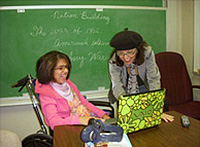What are some of the most common related services used in schools?
Page 8: Psychological Services
 As a related service area, psychological services are designed to provide supports for students who have academic, emotional, or behavioral issues related to their disabilities. As is the case with other related services, these services sometimes are direct services (e.g., evaluating a student) and sometimes they are more indirect (e.g., consulting with a teacher or a parent) in natural settings. Among the students who might benefit from psychological services are those who have:
As a related service area, psychological services are designed to provide supports for students who have academic, emotional, or behavioral issues related to their disabilities. As is the case with other related services, these services sometimes are direct services (e.g., evaluating a student) and sometimes they are more indirect (e.g., consulting with a teacher or a parent) in natural settings. Among the students who might benefit from psychological services are those who have:
 Difficulty organizing their time
Difficulty organizing their time- Trouble with their academic work
- Problems interacting with teachers, peers, or others in the school
- Poor study skills
- Struggles with family issues
- Problems with being teased or bullied
Qualified Providers:
School psychologists are trained in both psychology and education. In addition to completing a post-bachelor’s degree, school psychologists must hold a state certification or license in the state in which they work. The National School Psychology Certification Board (NSPCB) can also nationally certify them.
Roles: School psychologists work with students, the families of students, teachers, administrators, and the community to provide a myriad of services. Primary roles for school psychologists include assessment, counseling, and consultation. They connect the student to services both in and out of the school.
Additional Roles of School Psychologists
- Obtain, integrate, and interpret information about student behavior and conditions related to learning (e.g., functional behavior assessment*)
- Consult with other staff members in planning individualized programs to meet the special educational needs of students as indicated by psychological tests, interviews, direct observations, and behavioral evaluations
- Plan and manage a program of psychological services, including psychological counseling for children and parents
- Coordinate the response to intervention (RTI) data for evaluation purposes
- Assist in developing positive behavioral intervention strategies
- Help develop programs to promote mental health and wellness
* For more information on the role school psychologists play in the functional behavior assessment process, see the IRIS Module:
National Professional Organization:
the Psychologist's Corner
Listen as John Desrochers and Harry McCormick discuss some of the supports provided by school psychologists.

John Desrochers, PhD
School Psychologist,
Westport Public Schools
Westport, CT
Working with parents (time: 0:35)
Contributing to a student’s success (time: 1:10)
Transcript: John Desrochers, PhD – Working with students who have IEPs
In terms of special education, school psychologists are usually involved from the beginning. We are often members of IEP teams. By the time a child starts receiving special education, they’re usually receiving the most intense, individualized services a school has to offer. School psychologists are usually involved in programming for these students in a variety of ways. We help with assessing the nature of the student’s disability, his needs, his strengths, and so forth. We help design the individualized educational program. We provide consultation for teachers, for example, on approaches to instruction or behavior management. We also provide direct services for students. We might do a social-skills instruction and counseling as part of that IEP. We certainly would have a role in analyzing the results of the interventions to make sure they’re working and to provide suggestions for modifications or new interventions that might be needed.
Transcript: John Desrochers, PhD – Working with parents
We often do a lot of the work with parents so that they understand how we’re trying to help their children so that they can be full partners in the process. They need to understand the IEP process. They need to understand their children’s disabilities. They need to be brought into appreciating the range of services that schools have to offer so that they can make some good decisions about their kids and to be full partners in the IEP process. Parents have to see you as an ally. We’re all on the same boat here. We’re all trying to accomplish the same things.
Transcript: John Desrochers, PhD – Contributing to a student’s success
I think that teachers and school psychologists have to work together and reinforce each other’s work, and the end result will be better learning for students. I would like to have people know about school psychology and how we can contribute to the overall success of students. School psychologists directly impact teachers’ ability to do their job. And when they have that kind of support, teachers do a better job. I think that, unfortunately, people seem to expect teachers to be able to do it all, be a counselor, fix the family problems, analyze learning problems, all of these things, and at the same time trying to teach an entire classroom of kids. The reality is they can’t do it all. This is what contributes, I think, to some degree to teachers leaving the profession after only a few years. We have to start thinking about academic, social, and emotional learning as one seamless process. Children who improve academically do better socially and emotionally, and children who improve their social and emotional skills improve academically. One reinforces the other.

Harry McCormick, PhD
School Psychologist, Metro Nashville Public Schools
Nashville, TN
Collaborating with teachers (time: 1:03)
Transcript: Harry McCormick, PhD – Collaborating with teachers
We’re here for one purpose: We’re here to help this particular individual progress and learn. A lot of times, I think general education teachers think that school psychologists are not very approachable. They have to have a formal meeting to be able to approach them. We want to get the word out that they can talk to us in the hallway. They can schedule a time to meet with us. We have information that we would more than willingly share with them about different types of behaviors, about different types of academic issues, classroom management, motivation, a number of topics. All of us working together for the sake of that individual is probably the best. It’s not your child, or my child, or somebody else’s child. It’s all of our children.
